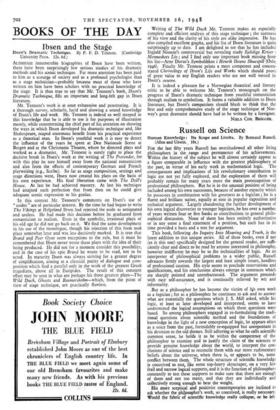BOOKS OF THE DAY
Ibsen and the Stage
ALTHOUGH innumerable bfographies of Ibsen have been written, there have been surprisingly few serious studies of his dramatic methods and his scenic technique. Far more attention has been paid to him as a scourge of society and as a profound psychologist than as a stage technician—probably because most of those who have written on him have been scholars with no practical knowledge of the stage. It is thus true to say that Mr. Tennent's book, Ibsen's Dramatic Technique, fills an important and long-felt gap in Ibsen literature.
Mr. Tennent's work is at once exhaustive and penetrating. It is a thorough survey, scholarly, lucid and showing a sound knowledge of Ibsen's life and work Mr. Tennent is indeed so well steeped in this knowledge that he is able to use it for purposes of illustration merely, while concentrating the chief part of his attention on showing the ways in which Ibsen developed his dramatic technique and, like Shakespeare, reaped enormous benefit from his practical experience as a theatrical man. In Ibsen's youthful work it is easy to detect the influence of the years he spent at Den Nationale Scene at Bergen and at the Christiania Theatre, where he directed plays and worked as a dramatist. Mr. Tennent is surely right to place the decisive break in Ibsen's work at the writing of The Pretender, for with this play he tore himself away from the national romanticism and also from the effects of contemporary German and French playwriting (e.g., Scribe). So far as stage composition, settings and stage directions went, Ibsen now created his plays on the basis of his own experience. His final liberation came with The Doll's House. At last he had achieved mastery. At last his technique had attained such perfection that from then on he could give adequate scenic expression to his genius.
In this context Mr. Tennent's- comments on Ibsen's use of " asides " are of particular interest. By the time he had begun to write The Vikings at Helgeland Ibsen had rejected the aside as antiquated and useless. He had made this decision before he graduated from romanticism to realism. Even in the symbolic, irrational plays of his old age he did not go back on it. We find the same development in his use of the monologue, though his rejection of this form took place somewhat later and was less decisively marked. It is true that Brand and Peer Gynt seem exceptions to the rule, but it must be remembered that Ibsen never wrote these plays with the idea of their being produced. He did not for a moment consider this possibility, and in the case of his epic Brand he wrote to be read, not to be acted. In maturity Ibsen was always striving for a greater degree of simplification, aiming at a classical purity of dialogue and com- position which find a parallel only in the work of the greatest Greek tragedians, above all in Euripides. The result of this constant effort may be seen in what are perhaps his three greatest plays—The Wild Duck, Ghosts and Rosmersholm—which, from the point of view of stage technique, are practically flawless. Writing of The Wild Duck Mr. Tennent makes an especially complete and efficient analysis of this stage technique ; the sureness of his view and the clarity of his style are alike impressive. He has also compiled excellent graphs, and his list of Ibsen literature is quite surprisingly up to date. I am delighted to see that he has included Ingjald Nissens's controversial but revealing study Sielelige Kriser 1 Menneskets Liv ; and I find only one important book missing frorr his list—Arne Duvas's Symbolikken i Henrik lbsens Skuespill (Oslo, 1946). Finally Mr. Tennent prints a most competent and concen- trated Chronology of Ibsen's Life and Works which should prove of great value to any English readers who are not well versed in Ibsen's oeuvre.
It is indeed a pleasure for a Norwegian theatrical and literary critic to be able to welcome Mr. Tennent's monograph on the progress of Ibsen's dramatic technique from youthful romanticism through realism to symbolism. It forms a valuable addition to Ibsen literature, but Ibsen's compatriots should blush to think that the first and only comprehensive study of the stage technique of Nor- way's great dramatist should have had to be written by a foreigner.
NLELS CHR. BROGGER.




































 Previous page
Previous page